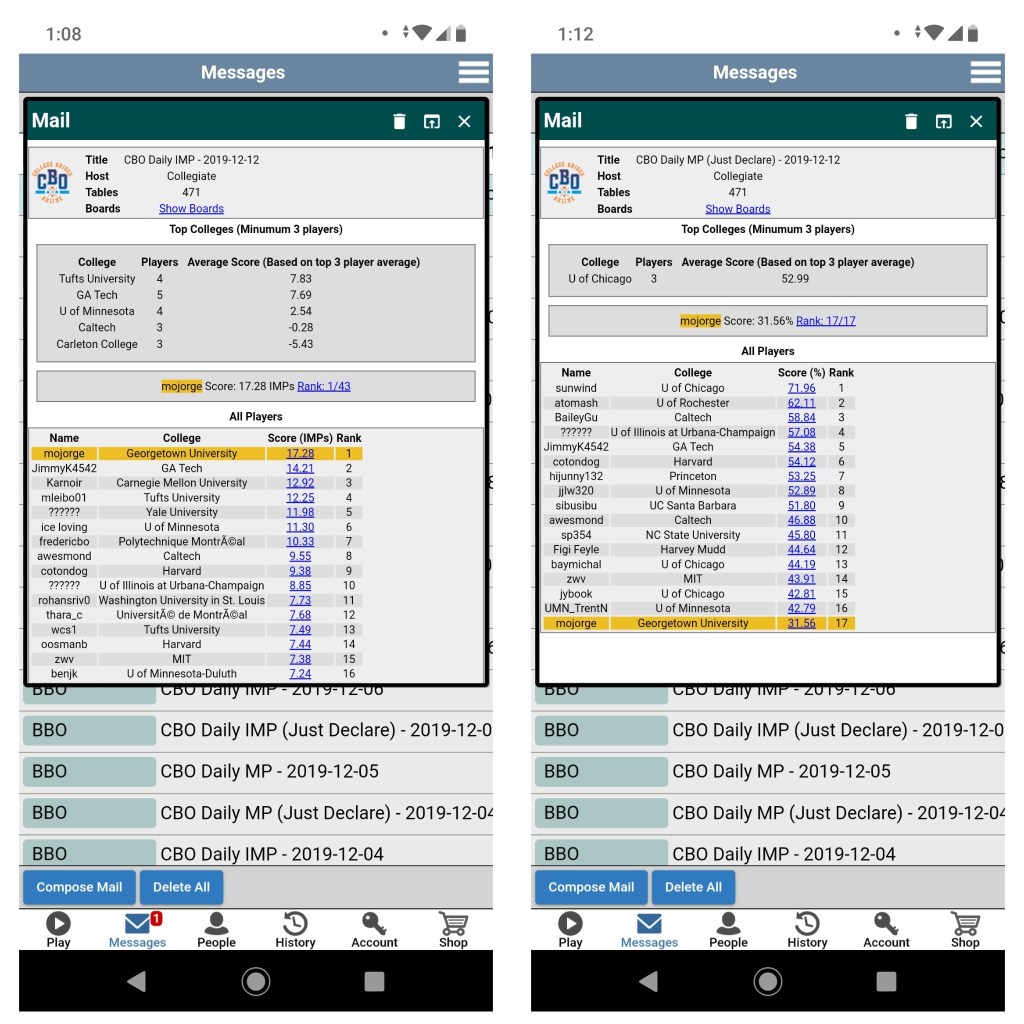This is a sequel to my post, https://jorgezhang.com/2019/12/01/a-month-of-playing-contract-bridge-online/, where I talked about my experiences playing Bridge over the month of November.






Interestingly, my performance was a lot more inconsistent during finals week, with both terrible and amazing results. On one day, I got both first and last place:

I also got a lot better by almost all metrics. I can’t really tell if this is because I am just used to playing against the robots now, or if I’ve actually improved, since I haven’t done a lot of Bridge reading since late December. Maybe it just takes a while to kick in?




Tips
While I am still just a beginner myself, I thought I’d give some tips on some habits that helped me improve at bridge. The stats make it clear that playing just a few hands of Bridge each day results in a significant improvement in results. Thus, my first tip is to play a lot.
It is equally important to put in focus and effort into every hand. Playing when I was hungry, tired, or distracted obviously impacted my immediate results. But it also affected my later results by getting myself into the habit of rushing through my games! When playing bridge, it pays significant dividends to pause for 30 seconds and analyze the hand. This was a big realization for me in February, where I realized that I was rushing into Just Declare IMPs games without looking at the bidding, and automatically playing whatever cards felt right without any analysis. Establish a good habit by only playing when you are focused, and waiting 30 seconds before making your first bid/play.
It is also really important to analyze your games after playing them, which I’ll admit to have slacked on recently. If you don’t analyze your games, you’ll never identify your mistakes! CBO doesn’t let you analyze the games until the next day (presumably to prevent cheating), but it is still worth it to take even a brief look through to see what contracts could have been made. Someone also recently told me about a really cool tool on BBO that you can use to analyze your results called “Double Dummy.”


Note that the contract can still be made even if the heart finesse fails, but cannot possibly be made if the club finesse fails.
As the previous example shows, this kind of error would be very hard to spot if it weren’t for the double dummy. The great thing about the double dummy feature is that it tells you exactly where/what your error was: and then you can logically determine why it was an error from there. Thus, my tip for improving would be to analyze your results and take advantage of the BBO double dummy software.
Finally, any people who are serious about getting better at bridge need to read some bridge books. I’ve stumbled across a bunch of them, and while many have been alright, I think that there is one book that I can recommend above them all. It was written in the 1930’s, but is still a phenomenal and mind-blowing book. I only really absorbed half of the stuff in there, and I still feel like I got a lot out of reading it: hopefully I’ll be able to reread it one day and grasp all of the nuanced strategy. I’m talking about Louis Watson’s Classic Book on “The Play of the Hand at Bridge,” which you can find here on amazon, or at the library (where I got my copy):
https://www.amazon.com/Watsons-Classic-Book-Play-Bridge/dp/0064632091
Summary:
- Play a lot
- Only play when you are focused
- Take 30 seconds to analyze the situation before you start playing
- Analyze your results
- Use BBO’s double dummy software to find your mistakes
- Read Louis Watson’s “The Play of the Hand at Bridge“
That’s all I’ve got for now! Any other tips you would like to share? Be sure to leave a comment below, and thanks for reading!